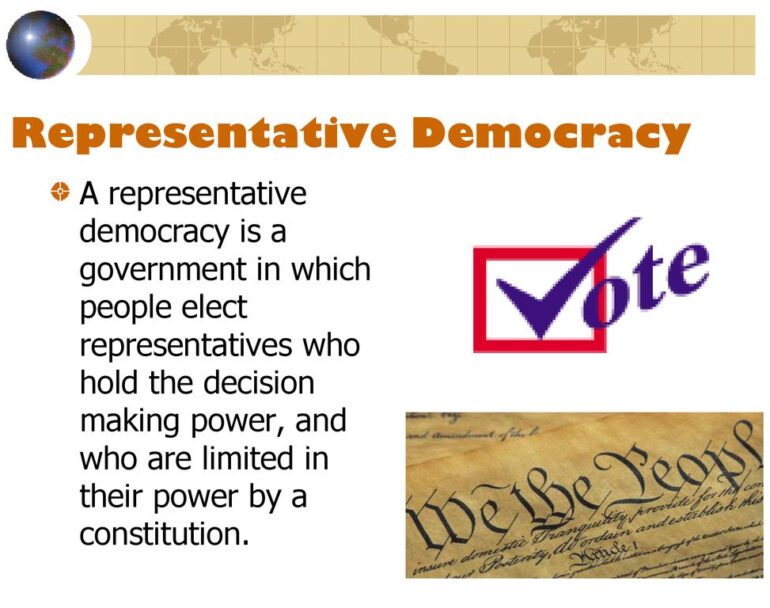
Representative Democracy – What is it?
by Jim Lewis
I have always been fascinated with progressive efforts to change the definitions of key words so that they may slowly change our society. Let’s look at two words that send chills up and down my spine.
Representative democracy
Encyclopedia Britannica – political system in which citizens of a country or other political entity vote for representatives to handle legislation and otherwise rule that entity on their behalf. The elected representatives are in turn accountable to the electorate for their actions.
Wikipedia – Representative democracy, also known as indirect democracy or electoral democracy, is a type of democracy where elected delegates represent a group of people, in contrast to direct democracy.
Merriam Webster – democracy in which the power is exercised by the people through their elected representatives : a form of government in which the people elect representatives to make decisions, policies, laws, etc.
Cambridge Dictionary – a system of government in which the people of a country elect the politicians who represent them and make decisions for them.
These are definitions from modern sources.
Just for comparison, let’s look at the Webster 1828 dictionary’s definition of a Republic.
REPUB’LIC, noun [Latin respublica; res and publica; public affairs.]
“A commonwealth; a state in which the exercise of the sovereign power is lodged in representatives elected by the people.”
Did you notice that the definition of a Republic is the same as the modern definition of representative democracy? Which one came first? In the 1828 dictionary there is no definition for representative democracy. So, whenever you see representative democracy used, they are actually substituting it, incorrectly, for the word Republic. It is all part of the political psychology to make everybody think we are a democracy instead of a Republic.
Even in the use of AI, when talking about American government, AI makes sure to throw the terms democracy and democratic elements in all over the place.
The Founder’s of this country had a choice to make in 1787, they were to choose what type of government the United States was to have. Monarchy? Oligarchy? Democracy? NO! They chose a REPUBLIC!
They had just fought a lengthy war to secede from the control of a monarchy in Great Britain. No oligarchy, we wanted no aristocracy in this country. Just about to a man, the founder’s had no use for a democracy, let me give you some of the sentiments expressed by them on the subject of democracies.
“The experience of all former ages had shown that of all human governments, democracy was the most unstable, fluctuating and short-lived.”
~John Quincy Adams
“Democracies have been found incompatible with personal security or the rights of property; and in general been as short in their lives as they have been violent in their death.”
~James Madison
“Between a balanced republic and a democracy, the difference is like that between order and chaos.”
~John Marshall
“It has been observed that a pure democracy if it were practicable would be the most perfect government. Experience has proved that no position is more false than this. The ancient democracies in which the people themselves deliberated never possessed one good feature of government. Their very character was tyranny; their figure deformity.”
~Alexander Hamilton
“Remember, democracy never lasts long. It soon wastes, exhausts, and murders itself. There never was a democracy yet that did not commit suicide.”
~John Adams
“We are now forming a republican government. Real liberty is never found in despotism or the extremes of democracy, but in moderate governments.”
~Alexander Hamilton
To better understand the Founder’s thinking all you need to do is read the Declaration of Independence, starting with the second paragraph.
“We hold these truths to be self-evident, that all men are created equal, that they are endowed by their Creator with certain unalienable Rights, that among these are Life, Liberty and the pursuit of Happiness.–That to secure these rights, Governments are instituted among Men, deriving their just powers from the consent of the governed, –That whenever any Form of Government becomes destructive of these ends, it is the Right of the People to alter or to abolish it, and to institute new Government”
This is what I like to call the American Manifesto! It explains who we are as a people, what we believe as to where our rights come from, and what the first purpose of government is. Randall Holcombe put it this way:
“The role of government as [America’s founders] saw it, was to protect the rights of individuals, and the biggest threat to individual liberty was the government itself. So they designed a government with constitutionally limited powers, constrained to carry out only those activities specifically allowed by the Constitution.”
~ Randall Holcombe from his book,
Liberty in Peril: Democracy and Power in American History
What you just read is the description of a Republic, which is what we are.
The powers embodied in America’s twenty-first-century democratic government are those that eighteenth-century Americans fought against to escape.
Be wary of anyone using the word democracy, in any form, to describe the American form of government.